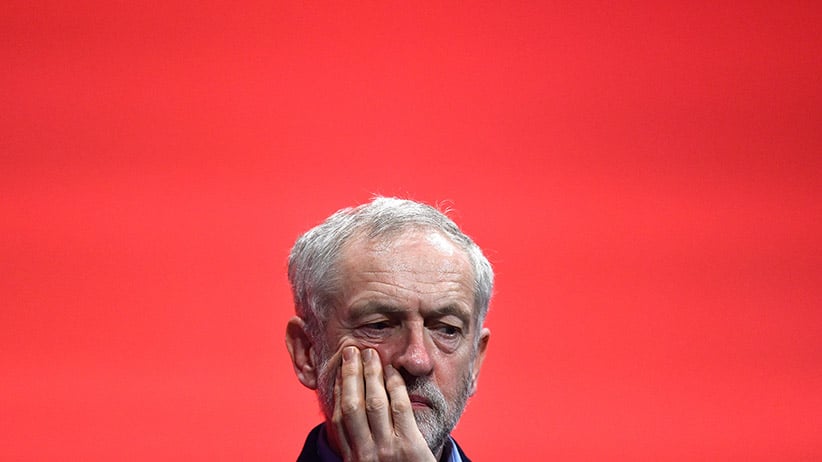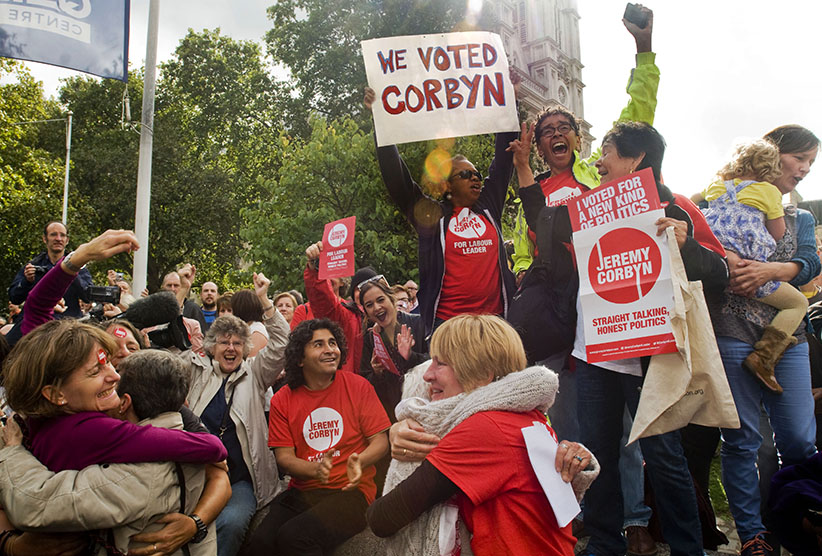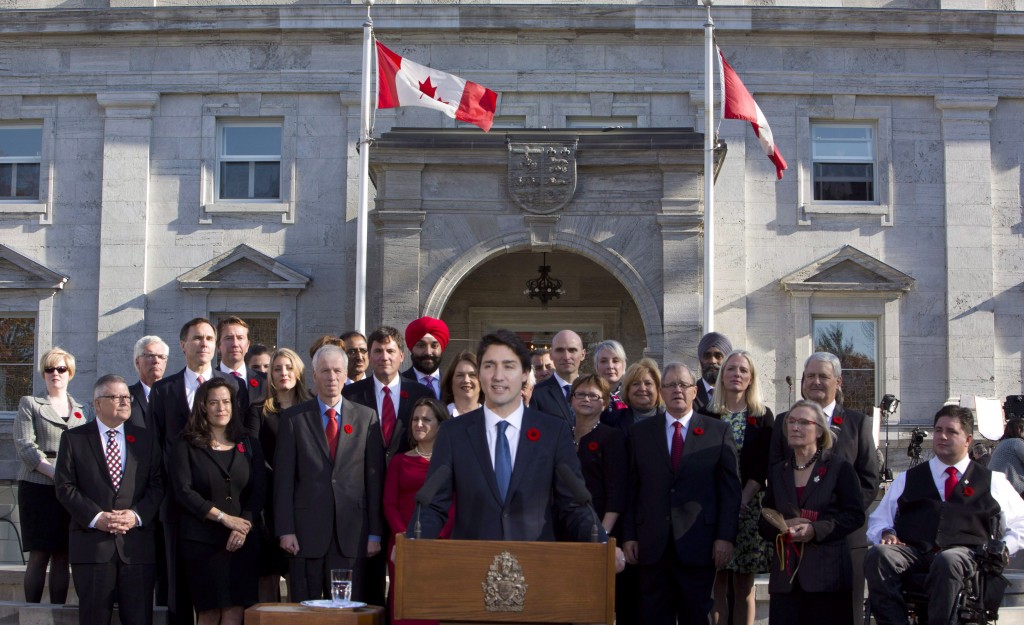No love in Labour: Jeremy Corbyn’s slipping grip on his party
Jeremy Corbyn’s Labour Party is openly rebelling against him. Why he needs to take a page from Justin Trudeau
Party leader Jeremy Corbyn listens as Britain’s shadow Chancellor of the exchequer John McDonnell delivers his keynote speech the annual Labour Party Conference in Brighton, Britain, 28 September, 2015. (Toby Melville/Reuters)
Share

A candidate runs for office with a pledge to change the way politics is practised. Powered by a fervent online following and mobbed in person at open meetings held across the country, he rejects the tightly scripted movements of modern politics in favour of jazzier beats.
Flush with a convincing mandate, and tired of what he calls the “old politics,” he pledges transparency and openness to debate. He isn’t the sort of leader, he says, who “wants to impose party lines.” He wants make his party from the “bottom up,” not “top down.”
Is this a scene from Justin Trudeau’s more collaborative Canada? Try Jeremy Corbyn’s Britain. Corbyn, 66, is the new leader of the Labour Party. He’s a radical-left republican and former union official who now heads Her Majesty’s loyal opposition, following a contentious leadership contest triggered by his party’s poor electoral results under Ed Miliband to David Cameron’s now-majority Conservatives.
On the surface, Jeremy Corbyn could scarcely be more different from the younger and more telegenic Trudeau. But there is one striking similarity: both men rode to unexpected victory on the back of “change.” But where Trudeau has worked carefully from the inside to retool a battered Liberal party, Corbyn is trying to effect a hostile takeover of a Labour Party that has yet to absorb the lessons of its most recent defeat. And where Trudeau has friends in the form of his new parliamentary colleagues, Corbyn finds enemies and rebels. To wit, a recent vote to authorize airstrikes in Syria nearly tore the Labour Party apart, with 66 of Corbyn’s colleagues defying their leader and supporting the Conservative government’s proposal.
“Corbyn’s support in the parliamentary Labour Party is not non-existent,” says Tim Bale, professor of politics at London’s Queen Mary University. “But it’s not much better than that.” Bale’s comment reflects the fact that Corbyn owes his leadership of Labour not to his colleagues, 90 per cent of whom supported other, more centrist, candidates, but rather to hundreds of thousands of new $6 “registered supporters” signed up by Team Corbyn, many of whom despised Labour when it was run by three-time majority winner Tony Blair.
This hatred, much of it attributable to the bungled Iraq war and growing economic inequality at home, has left Corbyn straddling a high wire between his base, who prefer more radical policies—an immediate end to austerity, greatly enhanced state benefits, and full nuclear disarmament—and the party he must lead to effect that change, who wish to follow a more centrist path.
“Labour has always had a tension between the ideal role of the mass membership as being the ultimate deciders of party policy, and a parliamentary party that actually has to execute and defend that policy,” explains Bale. “There’s still a lip service paid to the fact that the party is ultimately responsible to its members. But in reality it comes down to the leadership and the people in Parliament who are coordinated by that leadership.”
The problem for Corbyn is that he campaigned on an explicit pledge to abandon the tools traditionally used by leaders to coordinate activity. True to his word, the early days of the Corbyn era have featured no central control of communications or policy, numerous internecine (and public) rows over the same, and repeated attacks from a press who can’t believe their good fortune.

Corbyn had barely a week to celebrate his leadership victory before he ran into the hard shoulder of the “old” politics at the annual Labour policy conference. One of the first issues scheduled for debate? The renewal of Trident, the U.K.’s (rather expensive) submarine-based nuclear deterrent. A long-time advocate for disarmament, Corbyn is against Trident; the majority of his parliamentary party are for it.
Sensing the potential for a mushroom-cloud-sized clash with his new charges, Corbyn placed his trust in the party membership and declared that whatever the conference crowd decided on Trident would be fine by him. Anticipating precisely this gambit from their new leader, enterprising Labour MPs tucked the vote on the renewal of Trident into a broader endorsement of party defence policy. The motion carried, Trident was saved, and an early leadership crisis averted.
Alas, as any naval man will tell you, it’s loose lips that sink ships, and Jeremy Corbyn, a man who had spoken up hundreds of times against his official party line as a backbench MP, had the loosest lips of them all. The morning after the Trident endorsement an enterprising journalist asked Corbyn if he would ever be prepared to press the nuclear button. “No,” came the admirably clear reply. And with that, Labour’s nuclear gunboats were sunk.
The reviews of this early Corbyn performance weren’t great. “I don’t think that a potential prime minister answering a question like that, in the way in he did, is helpful,” said Maria Eagle, Corbyn’s own defence critic. “I think a British prime minister has to have that option and the whole purpose of the deterrent is, of course, to deter a potential enemy,” noted Hilary Benn, his foreign affairs critic. They were but two opposition critics to slap down their leader. Four more would follow by the end of the day.
If that sounds like chaos, that’s because it is. Imagine six ministers publicly sassing Stephen Harper. Or Justin Trudeau, for that matter.
A month into his tenure Corbyn finally succumbed to reality and hired journalist Seumas Milne to professionalize his communications operation. This succeeded only in provoking another bust-up with his MPs, however, as Milne has written approvingly of some of the world’s most odious regimes in his regular column in the left-wing Guardian newspaper.
While Corbyn insists he’s chuffed to have his colleagues asserting their independence under the umbrella of his “new” politics, to most voters it looks as though his party is confused and unprepared for power. And therein lies the conundrum of Corbyn’s “new” approach: electoral politics remains a team sport, and the players on the pitch must share the broad direction of travel if they are to achieve results.

This is where Justin Trudeau has applied a far more calibrated approach to change. Yes, Trudeau stressed “hope” in his plea to voters, but he also stressed “hard work.” That hard work has been in evidence since his swearing in as Prime Minister. His early November cabinet reveal was both fresh and tightly choreographed. In a town accustomed to a mute one-man band led by Stephen Harper, the multi-voiced Trudeau chorus was a strong signifier of change.
This change in tone not only helped Trudeau reach power, argues Nelson Wiseman, director of the Canadian studies program at the University of Toronto, it has also served Trudeau well in the days since his swearing in. “I think the civil service is overjoyed and they’re trying to help the Liberals as much as they can,” Wiseman says. He suggests the Liberals have also paid careful attention to another important Ottawa constituency: “The media are thrilled with the access.”
While Team Trudeau continues to execute its plan to consolidate its grip on the machinery of government, Corbyn is under daily assault: the government blitzes him; the press remain hostile; and the more moderate elements of his party continue to plot against him. Despite these obstacles, Corbyn remains defiant, claiming a recent by-election win by a centrist Labour candidate as his own.
An equivocal response to the recent Paris attacks and the resulting Syria vote has only upped the pressure on Corbyn. “Unless all of the laws of political gravity are suspended . . . it is very difficult to see how someone with the views that are so radically different to most people in the electorate can actually succeed in bringing the Labour Party more votes and the chance of government,” notes Bale. Most observers give Corbyn until the May 2016 Welsh and Scottish elections to prove himself. Failures there, or in the mayoral election in London, and Corbyn’s enemies will argue they have enough ammunition to lead a coup.
Trudeau’s successes help to illustrate Corbyn’s failures. Having never expected to win his office, it now appears that Corbyn has no plan to cement his new politics into practice. Having prepared carefully for his turn, Trudeau looks to have moved assuredly to transform his campaign’s “sunny ways” into a more enduring forecast. Here, the veteran Corbyn has much to learn much from his younger comrade.